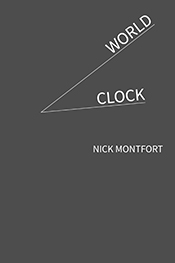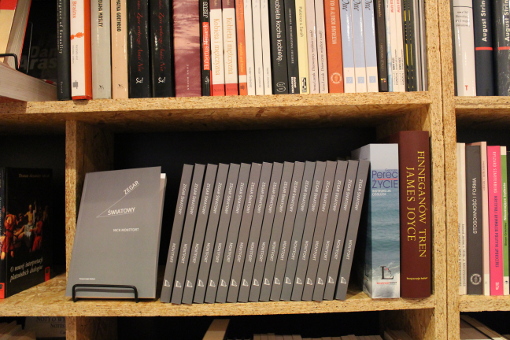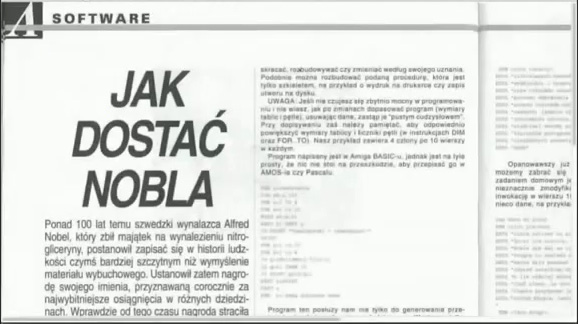I’m going to talk about a bot-like creation that was occasioned by NaNoGenMo last year, World Clock. It has a rather curious story to what’s happened after I developed it.
The story begins at the very end of November. You can see I managed to get this page posted on November 30th just after noon, so I had almost twelve hours before the end of NaNoGenMo. I wrote a short program, although longer than many that I write. I have a series of 256-character Perl programs that are poetry generators. They don’t use any external data sources; they’re not using sources from the network or files offline. They’re self-contained. So this is actually a longer text generator from my standpoint. This is the code. There’s 165 lines of Python, and it generates stories, if you call them that, about what happens at every minute of the day, 1440 little vignettes about people reading things around the world.
I think right now it’s 23:00, 22:00 GMT, is that right? That’s probably close.
It is now right at 00:23 in Prague. In some ordinary yet nestlike residence a person named Yonas, who is quite sizable and imposing, reads a tiny numeric code on a box of breakfast cereal. He nods, very deliberately.
World Clock, Nick Montfort [PDF]
 All 1440 parts of the book sound more or less like that, and I initially presented it as a 246-page PDF and as code. Then I had it printed here in town at the Harvard book store, which has an Espresso print-on-demand machine, so it’s available there and it looks like this, for the lucky ones of you who are not on the Internet right now I’ll hand it around.
All 1440 parts of the book sound more or less like that, and I initially presented it as a 246-page PDF and as code. Then I had it printed here in town at the Harvard book store, which has an Espresso print-on-demand machine, so it’s available there and it looks like this, for the lucky ones of you who are not on the Internet right now I’ll hand it around.
Among other things, I run this lab here at MIT, The Trope Tank, and I have people who we’re fortunate to work with thanks to Fulbright and their fellowships, and people from around the city. We’ve been working on projects related to, among other things, old computers—material computing history—but also translation and editions of literary works that are computational. Things like bots, interactive fiction, poetry generators, story generators, and systems of that sort. So I’m lucky that several of my works have been published and have been translated. One of the things that we’ve done is working with Piotr Marecki, who didn’t know how to program before he came over here to MIT. He decided he wanted to do a Polish translation of World Clock and he did the translation by translating the underlying 165-line Python program.
It’s interesting because one of the things about doing this it expresses a lot of problems in translation, and they’re not just problems like for instance Polish is inflected. They’re not problems with the language itself, but they’re also problems with lexical resources and [inaudible; encoding glitch] sort of linguistic resources that you’re using. If you’ve done something neat with WordNet, you might find that much of Europe, all of Africa, there are no— Even if a WordNet-like resource exists, it’s not free. So you can’t use it unless you’re paying a lot as a member of a linguistic consortium. Or you might find that the resource isn’t there, or that it’s just not nearly as good in a lot of cases.
The only actual lexical resource that this system uses is the timezone database that all of our computers have. That’s where the cities are generated so that we know where they are in time so that time can be created appropriately. But those aren’t the Polish names of the cities and they don’t have the correct inflection, so that’s just one of the issues. I’ll hand around Zegar światowy, the Polish translation of World Clock.
 It’s an interesting process to do this. The Polish program ends up being longer and there are certain compromises that have to be made in how things are presented. That being said, people in Poland, perhaps because the epigraph for this text comes from Stanisław Lem, were very interested in the Polish translation of World Clock. I did a reading of this book at the Harvard Book Store on September 18th along with some others, and here’s the book published in Polish at the ha!art book store. This is the leading avant-garde press in Kraków, which is the Unesco City of Literature. They read a lot there. They’re [really?] into books and stuff. And you can see it’s published in the same series as Georges Perec’s Life A User’s Manual. Not pictured is Tristram Shandy, which is also in translation in the same series, and Finnegans Wake. So not bad for four hours of work on November 30th last year. Of course my translator and others worked on this as well.
It’s an interesting process to do this. The Polish program ends up being longer and there are certain compromises that have to be made in how things are presented. That being said, people in Poland, perhaps because the epigraph for this text comes from Stanisław Lem, were very interested in the Polish translation of World Clock. I did a reading of this book at the Harvard Book Store on September 18th along with some others, and here’s the book published in Polish at the ha!art book store. This is the leading avant-garde press in Kraków, which is the Unesco City of Literature. They read a lot there. They’re [really?] into books and stuff. And you can see it’s published in the same series as Georges Perec’s Life A User’s Manual. Not pictured is Tristram Shandy, which is also in translation in the same series, and Finnegans Wake. So not bad for four hours of work on November 30th last year. Of course my translator and others worked on this as well.
This is the first review, which a Ukranian scholar wrote in Polish of the book. I think she liked it. And interestingly enough this book has actually been reviewed eight times in Polish, just in the last month. It was only published just more than a month ago at the beginning of October.
People had a lot of interesting reactions. One of the things that happened that I was surprised about is that some people actually read the book, which I find [inaudible; audience laughter]. The series editor for the Liberatura series in which it appears read the book and so did the Polish translator of Finnegans Wake, which of course that’s not the most outrageous thing he’s done in his life. But still.
 We were on Radio Krakow. There’ve been a large number of reviews. A lot of discussion. Here’s the leading Polish daily newspaper, which absolutely slammed the book. That’s a picture of Stanisław Lem himself looking completely fed up with World Clock. He died eight years ago, but still. You have to put his image there to show people this, right?
We were on Radio Krakow. There’ve been a large number of reviews. A lot of discussion. Here’s the leading Polish daily newspaper, which absolutely slammed the book. That’s a picture of Stanisław Lem himself looking completely fed up with World Clock. He died eight years ago, but still. You have to put his image there to show people this, right?
So it’s actually received a lot of comment, and one of the reasons to bring things into these other cultural language contexts that people have very different reactions. My book #! came out this summer and it hasn’t been reviewed in the New York Times. In fact Zach Whalen did the first review of it, which is a one-line Perl program.
[Over the next three paragraphs, links are to the published works in Cura.]
There’s a lot of interesting things. It might be rewarding or you might come into contact with new sorts of readers and new sorts of experiences, but I want to mention a little bit more about translation from a perspective here. This is a project that’s supposed to look unfinished because we’re still at work on this. It’s going to be published, thanks to Allison, in Fordham University’s literary journal Cura. Here we have thirteen works that originate in other languages, and we’ve translated them to English. This is one by one of my collaborators in The Trope Tank, Andrew Campana, “Seika no Kôshô.” “Seika no Kôshô” is one that just repeatedly says “Seika no Kôshô” again and again. Japanese is a very homophonous language, so you can write that many many thousands of different ways. The English translation explains what it is that these different versions of the phrase “Seika no Kôshô” actually mean. They all have meanings, you just can’t tell from listening to them.
We have poetry generators in Spanish. I have been in touch with Félix Remirez whose “Sample Automatic Poem” we translated. The interesting thing is when you put these together you see that the quasi-parody poetry generator in Spanish is not the same as the one in Polish is not the same as the one in Japanese. They formally work in different ways and they’re quite interesting. “Contemporary Japanese Poetry Generator” is great.
One of the things that we came up with is we found this 1993 Amiga magazine with a BASIC program in it. The headline says “How to win a Nobel Prize.” We translated this program. This is a Communist speech generator. This is what they were doing with their Amigas in 1993 in Poland, just a few years after the fall of the Berlin Wall and the dissolution of the Soviet Union. [So this is?] this sort of statement.
So I wanted to brag about the Polish translation of World Clock in part, but also talk about translation as a really interesting aspect of— You know, the way that we think about from a literary standpoint, literary translation, not just a quick industrial sub-titling of films but taking care with productions like this, and taking care with the reading and being sensitive culturally is really quite compelling. And it’s something that as we continue to develop bots and work in this area we should be thinking about. If you know of bots in other languages, let me know because we’d like to translate them.

